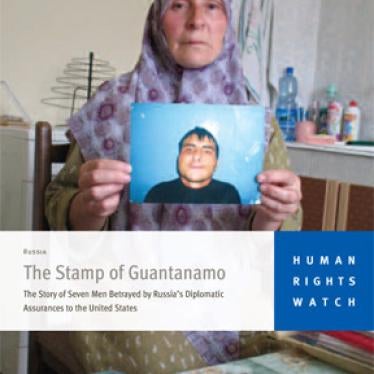(Moscow, December 2, 2008) - The health of a former Guantanamo detainee has declined alarmingly in a Russian detention facility, and he should be given immediate access to an independent medical examination and appropriate treatment, Human Rights Watch said today.
The former Guantanamo detainee, Rasul Kudaev, has been held for more than three years in pretrial detention in Nalchik, a city in southern Russia, accused of participating in an October 2005 armed uprising against the local government. He was severely tortured in custody. Human Rights Watch urged that Kudaev's lawyer be present during any medical examination.
"Rasul Kudaev has not been convicted of any crime, but prison authorities are putting his life at risk by letting his health collapse," said Carroll Bogert, associate director of Human Rights Watch. "The Russian government must get him decent medical treatment immediately."
Kudaev is one of seven Russian citizens whom the US government sent back from Guantanamo to Russia in 2004 despite their fears of being tortured and ill-treated back home. Human Rights Watch detailed their harassment and mistreatment by Russian authorities in a 2007 report "The Stamp of Guantanamo". It is a violation of the Convention against Torture, as well as other US and international laws, to involuntarily return people to a country where they are in danger of being tortured.
The Nalchik uprising reportedly resulted in more than 140 deaths, including 35 law enforcement officers, 15 bystanders, and at least 92 of those involved. According to photographs, medical records, court documents, and the testimony of lawyers and family members, Kudaev was repeatedly beaten in custody in an effort to compel him to confess to involvement in the uprising.
Kudaev began to suffer liver problems while in detention at Guantanamo Bay and was receiving outpatient treatment for liver disease in October 2005 when the Nalchik uprising occurred. His mother told Human Rights Watch that although she brought him medication, he has not regularly received it. In May, Kudaev's condition worsened and his lawyer petitioned for a medical exam and treatment. Prison authorities issued medical conclusions stating that Kudaev was healthy, but began treating Kudaev without informing his lawyer. The treatment stopped at the end of June.
Kudaev's condition has deteriorated markedly over the last several weeks. Kudaev's mother and his lawyer told Human Rights Watch that Kudaev is currently suffering liver failure exacerbated by poor conditions, including inedible food, in detention. The skin on the right side of his back has hardened, the whites of his eyes are deep yellow, and he has trouble walking due to pain. In mid-November, Kudaev and his lawyer requested a medical examination. Prison authorities agreed to the exam but refused to allow it to be conducted by an independent doctor. They pledged to release all the medical records and photos taken during the medical examination, yet they barred Kudaev's lawyer from being present at his client's medical exam. The exam has not yet been scheduled.
One of the defendants in the Nalchik case, Valeri Bolov, died in February 2008 of cirrhosis of the liver, which was never treated in prison. He was released to his relatives from pretrial detention when he was already dying.
The detention facility authorities should immediately improve detention conditions for Kudaev, ensuring that he receives urgent medical assistance and has unrestricted access to legal counsel, Human Rights Watch said.
"Kudaev's case shows how vulnerable former detainees from Guantanamo are to abusive treatment back home," said Bogert. "As US President-elect Barack Obama considers how to close Guantanamo Bay, the experience of people like Rasul Kudaev should be taken into account - and never repeated."







